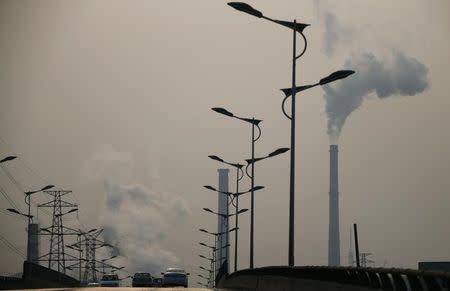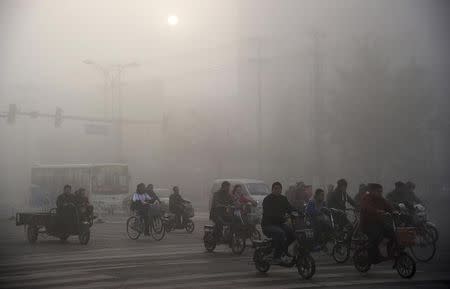China's Hebei to force firms to buy emission permits from 2016
BEIJING (Reuters) - China's biggest steelmaking province, Hebei, will order its big industrial emitters to pay for the pollution they discharge via a regional trading scheme beginning next year, the official Hebei Daily newspaper said on Monday. Last year, seven of China's 10 smoggiest cities were situated in the northern province and it is under pressure from nearby Beijing to take action to control pollution from heavy industry. Starting in 2016, steelmakers, power suppliers and manufacturers of cement and glass will be forced to pay for permits to cover the amount of pollution they emit, and the government will set the amount of permits required by other industries by this year, the newspaper said. China has already rolled out pilot emission permit markets in 11 provinces, covering air pollutants such as sulphur dioxide and nitrogen oxides, as well as water pollution indicators such as chemical oxygen demand and ammonia. Hebei was forced to shut down its steelmaking facilities temporarily last November to help clear the skies during an Asia-Pacific Economic Cooperation summit in Beijing. It is also working to close 60 million tonnes of steel capacity and cut coal consumption by 40 million tonnes over the 2014-2017 period. It has also promised to cut small breathable particles known as PM2.5 by 8 percent this year, up from a previous target of 4 percent per year. But the efforts have hurt the local economy and the government has been looking for market solutions. It has not yet been decided which platform will host the provincial permit auctions. Since 2012 Hebei has been forcing new industrial facilities to buy permits before they can get approval for construction. The local environmental protection bureau, which regulates the market, set the benchmark price for sulphur dioxide at 5,000 yuan ($807) per metric ton (1.1023 tons), while ammonia was set at 8,000 yuan per tonne in February. "There is not much trading activity, since the companies are under no pressure to trade unless they have been ordered to participate in the auctions," said a manager with the Hebei Environment Energy Exchange who did not want to be named because he is not authorized to speak to the media. (Reporting By Kathy Chen and David Stanway; Editing by Alan Raybould)


